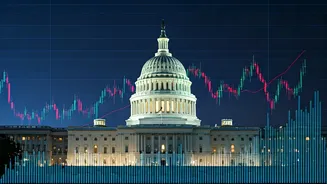Shutdown's Immediate Impact
The brief US government shutdown caused noticeable shifts in the financial markets. The uncertainty created by the shutdown led to initial hesitancy among
investors. While the shutdown was short-lived, it still generated a degree of anxiety. The immediate concern was centered on how government operations would be affected and how this might influence broader economic indicators. Specifically, the delay in the release of certain economic data raised concerns. Market participants closely monitored these events, assessing their potential long-term impacts on growth and investor confidence. The news of a looming shutdown triggered some volatility, which then prompted investors to reassess their strategies and manage their risk exposures, and in turn, caused ripple effects across various sectors.
S&P 500 Performance
The S&P 500 index, a key barometer of the US stock market, showed mixed reactions during the period surrounding the government shutdown. Initially, as concerns of the shutdown grew, the index experienced fluctuations. However, the S&P 500 tends to be affected by broader economic conditions and investor sentiment. This sentiment is often shaped by numerous factors, including news of the resolution. Despite the initial concerns, the index was able to demonstrate resilience once the resolution seemed near. This suggested that investors were somewhat reassured that the shutdown would not significantly disrupt business and economic activities. Analyzing the movement in the S&P 500 in the context of the shutdown provides essential insight into investor perspectives and market stability in the wake of political events.
Dow Jones Reaction
The Dow Jones Industrial Average, comprising major US companies, similarly responded to the government shutdown. Similar to the S&P 500, it faced some volatility at the beginning of the shutdown. The Dow Jones is viewed by many as a benchmark for American industrial activity. During periods of uncertainty, like the government shutdown, investors often reassess their holdings. However, as news of an end to the shutdown emerged, the Dow Jones displayed signs of stabilization. This indicates that major corporations’ stocks were viewed positively. This is further evidence of the market's confidence in the government's ability to minimize disruption. The Dow Jones’ performance reflects a broader market trend where the anticipation of political stability encourages investor confidence.
Nasdaq's Response
The Nasdaq, particularly influenced by technology stocks, also experienced changes as the shutdown unfolded. Due to the high-growth and often volatile nature of tech stocks, the Nasdaq tends to be sensitive to the economic landscape. Tech stocks are often regarded as forward-looking, and any hints of economic instability can affect investor confidence. With the government shutdown creating uncertainty, Nasdaq experienced some volatility. Investors responded by adjusting their portfolios. Furthermore, as the prospect of the shutdown's conclusion became clearer, the Nasdaq rebounded, showing its resilience. The Nasdaq's response illustrated investor confidence in technological advancements and in the economy’s ability to withstand political turmoil. This trend underscores the importance of investor sentiment and market expectations in shaping the performance of tech-focused indices.
Future Market Outlook
Looking ahead, the resolution of the government shutdown is expected to bring some relief to the markets. Once the government resumes normal functions, economic indicators are expected to return to their regular schedules. This restoration of predictability could benefit market participants, allowing investors to base their decisions on more reliable information. The focus will then likely shift to other economic indicators and developments in other policy arenas. These events could then have a greater impact on market performance. Analysts are watching how the market adapts to the resolution, and how these broader factors influence investor attitudes. The future outlook remains subject to economic trends and investor confidence. It is also important to consider the underlying strength of the economy to accurately forecast the future market conditions.













